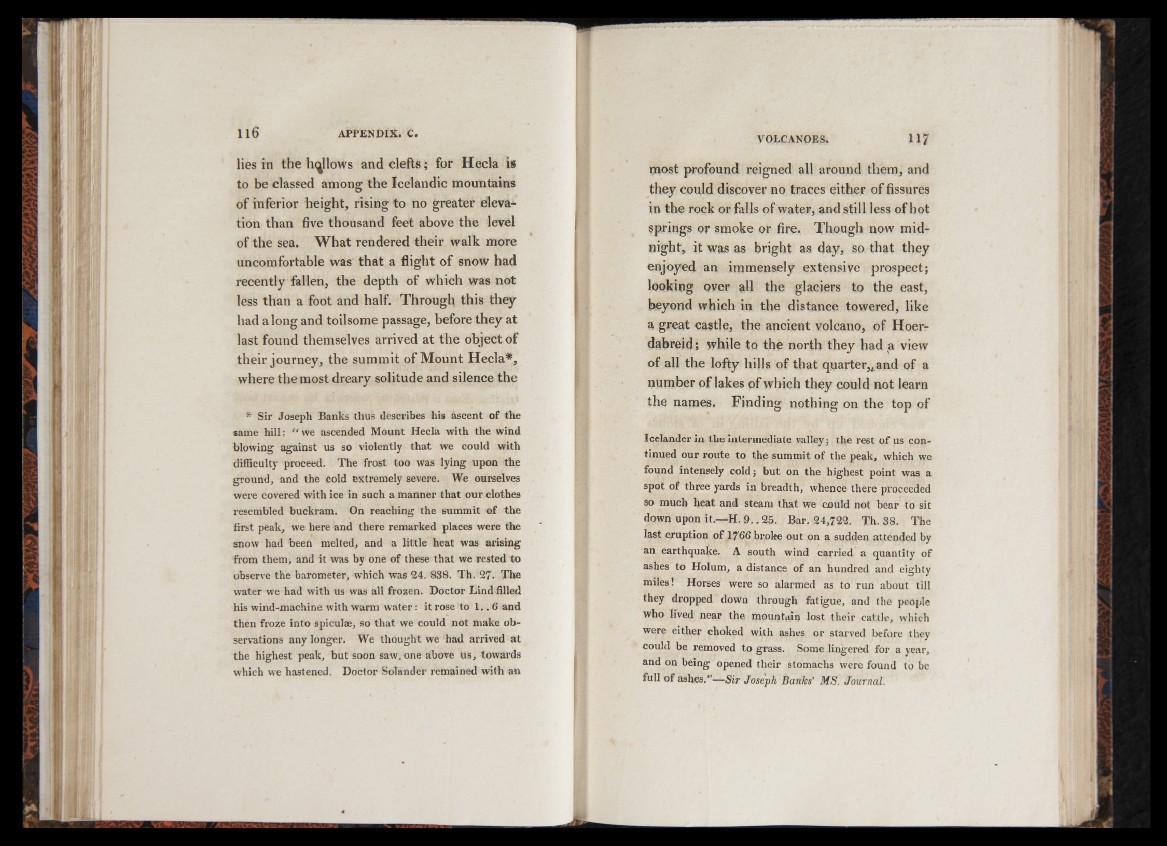
lies in the hollows and clefts; for Hecla is
to be classed among the Icelandic mountains
of inferior height, rising to no greater elevation
than five thousand feet above the level
of the sea. What rendered their walk more
uncomfortable was that a flight of snow had
recently fallen, the depth of which was not
less than a foot and half. Through this they
had a long and toilsome passage, before they at
last found themselves arrived at the object of
their journey, the summit of Mount Hecla*,
where the most dreary solitude and silence the
* Sir Joseph Banks thus describes his ascent of the
same hill: ffwe ascended Mount Hecla with the wind
blowing against us so violently that we could with
difficulty proceed. The frost too was lying upon the
ground, and the cold extremely severe. We ourselves
were covered with ice in such a manner that our clothes
resembled buckram. On reaching the summit of the
first peak, we here and there remarked places were the
snow had been melted, and a little heat was arising
from them, and it was by one of these that we rested to
observe the barometer, which was 24. 838. Th. 27. The
water we had with us was all frozen. Doctor Lind filled
his wind-machine with warm water: it rose to I . . 6 and
then froze into spiculse, so that we could not make observations
any longer. We thought we had arrived at
the highest peak, but soon saw. one above us, towards
which we hastened. Doctor SoTander remained with an
most profound reigned all around them, and
they cou,ld discover no traces either of fissures
in the rock or falls of water, and still less of hot
springs or smoke or fire. Though now midnight,
it was as bright as (Jay, so that they
enjoyed an immensely extensive prospect;
looking over all the glaciers to the east,
beyond which in the distance towered, like
a great castle, the ancient volcano, of Hoer-
dabreid; while to the north they had a view
of all the lofty hills of that quarter,¿and of a
number of lakes of which they could not learn
the names. Finding nothing on the top of
Icelander in the intermediate valley; the re6t of us continued
our route to the summit of the peak, which we
found intensely cold; but on the highest point was a
spot of three yards in breadth, whence there proceeded
so much heat and steam that we could not bear to sit
down upon it.—H. 9 ., 25. Bar. 24,722. Th. 38. The
last eruption of 1 7 6 6 broke out on a sudden attended by
an earthquake. A south wind carried a quantity of
ashes to Holum, a distance of an hundred and eighty
miles! Horses were so alarmed as to run about till
they dropped dowu through fatigue, and the people
who lived near the mountain lost their cattle, which
were either choked with ashes or starved before they
could be removed to grass. Some lingered for a year,
and on being opened their stomachs were found to be
full of ashes.”—Sir Joseph Banks' MS. Journal.